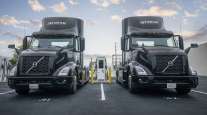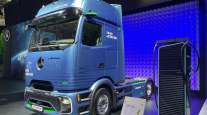DTNA Already Working on Phase 2 GHG Compliance

ATLANTA — Presentations by Daimler Trucks North America looked to the future, including the notion of CascadiaE, an all-electric Class 8 the parent company of Freightliner Trucks might one day produce.
Martin Daum’s thoughts on electric highway tractors were floated Sept. 24 at a customer reception here by the former Freightliner chief who now heads Daimler AG’s global truck business.
NACV COVERAGE: All stories | Live blog | Photo gallery
Before his engineers can finish that, however, they must deal with the Phase 2 federal greenhouse gas rule for trucks and their engines that rolls out in 2021, 2024 and 2027.
Two major DTNA executives said after the company’s Sept. 25 press conference at the inaugural North American Commercial Vehicle Show that the solutions for 2021 largely are in hand already, and the company is at work on the 2024 and 2027 stages.
For trucks and engines, “We’re already at the 2021 level, more or less. We’ll be able to make it, with everything in place,” said Wilfried Achenbach, DTNA’s senior vice president of engineering and technology.
.@DaimlerTrucksNA's Kary Schaefer: remote updates will be part of base Detroit Connect subscription for new Cascadia. pic.twitter.com/4htoRAh9cO — Seth Clevenger (@SethClevenger) September 25, 2017
Kary Schaefer, DTNA general manager of marketing and strategy, said the Portland, Ore., original equipment manufacturer will not have to ambush truck buyers in order to comply with the regulation.
“We don’t have to force options,” she said on the exhibit floor of the Georgia World Congress Center.
“We’re very disciplined in our payback analysis before we release a product,” Schaefer added.
Achenbach said it is not too early to be thinking about the 2024 and 2027 segments.
“We already have the same confidence on the ’24 and ’27 stages that we do for 2021. It takes four, five or six years for vehicle development,” he said, so waiting for one or two years before the deadline would not provide enough time.
Asked about Tenneco Inc., the Tier 1 supplier that focused on waste heat recovery at its press conference, Achenbach agreed with Tenneco that organic Rankine cycle technology is interesting, but also complex.
“We have experience with the technology,” he said. “It is feasible but it is expensive. It doesn’t add up right now.”
Tenneco Chief Technology Ben Patel said his company is shooting for 2022-2025, as a waste heat goal.
Achenbach was skeptical though.
“We’ll continue to work on it, but it’s not on a timeline now. I’d rather push aerodynamic solutions right now,” he said of tactics for improving vehicle mileage.




